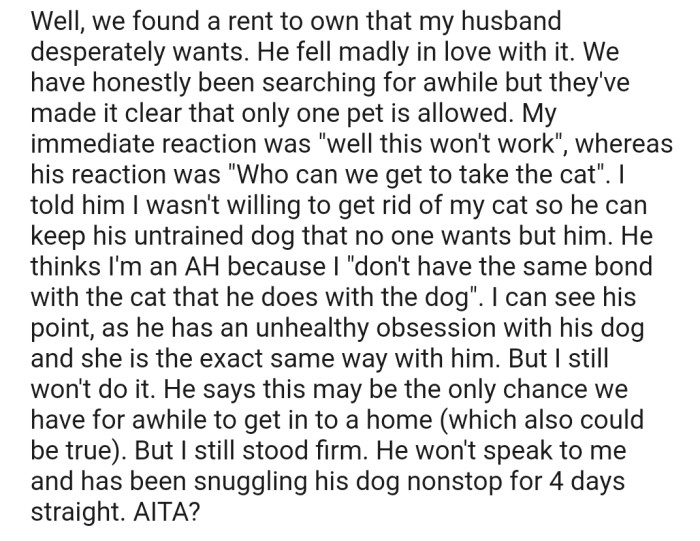Couple Get Into Heated Argument Over Which Pet Will Join Them In Their Dream Apartment With A One-Pet Rule, The Wife's Cat Or The Husband's Untrained Dog
In a world where pets are the new family members, one Redditor finds themselves caught in a furry feud between their beloved cat and their husband's untrained dog. What began as a simple compromise to get a dog has spiraled into a conflict that now threatens the family's dream of finding the perfect home.
As the dog runs wild and untrained, her presence disrupts the harmony of the home, causing tension and resentment to grow. Despite the chaos, OP's husband is blinded by his love for his canine companion, failing to see the havoc wreaked on the household.
In the midst of this furry frenzy, a glimmer of hope emerges in the form of a rent-to-own home – the perfect opportunity for the family to settle down. Yet, the house comes with a catch: only one pet is allowed.
When faced with this ultimatum, OP stands firm in their refusal to give up their cherished cat, sparking a standoff between them and their husband.
I told him I wasn't willing to get rid of my cat so he can keep his untrained dog that no one wants but him. He thinks I'm an AH because I "don't have the same bond with the cat that he does with the dog."
As OP's husband clings to his canine companion, the question remains: Is OP the antagonist in this tale, or is the real villain their husband, who has refused to acknowledge the strife caused by his untrained dog?
Check out the full story below...
Let's dig into the details...

OP has a sweet little cat while their husband has an untrained dog that's terrorizing the entire family

The couple found a great house they want to move into, but the rule states that only one pet is allowed. Now OP and her husband have to decide whose pet is staying and whose is getting adopted

The Emotional Attachment to Pets
Dr. Alicia Moore, a psychologist specializing in human-animal relationships at the University of Washington, explains that pets often represent emotional support and companionship.
Her research highlights that pets can fulfill significant emotional roles in our lives, making decisions about them particularly charged.
When couples argue about pets, it often reflects deeper issues about attachment and priorities in their relationship.
Understanding Attachment to Pets
Dr. John Archer, a psychologist from the University of Central Lancashire, emphasizes that pets often serve as significant sources of emotional support for their owners.
His research indicates that the bond between humans and pets can evoke feelings of comfort and security, which may explain the couple's passionate debate over their respective pets.
When a couple's emotional investments in their pets clash, it can lead to a deeper examination of their values and priorities.
Navigating Pet Ownership in Relationships
Conflict over pet ownership often reflects deeper relational dynamics, as pets can symbolize attachment and care.
Research from the University of Virginia suggests that disagreements over pets may indicate underlying issues in the relationship.
Pets can serve as emotional anchors, and conflicts may arise when partners have differing views on their role in family life.
A little more insight

Here's how the Reddit community reacted to the story:
"Rehome your husband"

"You didn't ask him to get rid of his dog. He didn't even ask; he ASSUMED you would get rid of your cat."

Studies show that disagreements over pets can signify underlying tensions in the relationship.
According to research published in the Journal of Social Psychology, conflicts about pets often stem from differing values or expectations between partners.
Understanding these dynamics can help couples navigate their disagreements more effectively.
Research by Dr. Terri Orbuch, a relationship researcher and author, highlights that "pets often serve as a source of comfort and companionship, but they can also introduce tension when couples disagree on their roles within the family." Couples frequently view their pets as integral family members, which can intensify conflicts regarding their care and presence in the home. Understanding these dynamics is crucial for effectively navigating the emotional complexities of shared pet ownership.
A study published in the Journal of Social Psychology indicates that couples who disagree about pet responsibilities often exhibit other communication issues.
Understanding these dynamics can help partners address not just the pet-related conflict but broader relational challenges.
"NTA...'Well, this won't work' is the right answer. That either of you should get rid of a beloved pet is the wrong one."

"That dog needs a better owner who's going to train it."

"Stand your ground. The cat was family first. The untrained dog is untrained, and your husband seems not to plan on training him."

Negotiating Pet Ownership in Relationships
Negotiation is a critical skill when it comes to managing shared responsibilities, especially regarding pets.
Dr. Peter Johnson, a relationship expert from Duke University, emphasizes the importance of compromise and communication in these discussions.
His research shows that couples who actively engage in negotiation tend to experience less conflict.
The Role of Compromise in Relationships
Compromise is a vital component of any successful relationship. Dr. William Doherty, a family therapist, emphasizes that relationships thrive on the ability to negotiate differences respectfully.
In this case, the couple could benefit from discussing their reasons for wanting their respective pets in the new apartment, which may reveal deeper values and emotional attachments.
By understanding each other's perspectives, they can work toward a mutually acceptable solution.
The Importance of Compromise in Relationships
Compromise is a fundamental aspect of healthy relationships, especially when it comes to shared responsibilities like pet ownership.
Research suggests that partners who navigate compromises effectively tend to report higher relationship satisfaction.
Involving both parties in decision-making about pets can foster a sense of partnership.
"NTA. It sounds like your husband is a poor pet owner"

"It sounds like OP's husband only likes the IDEA of having a dog, but not actually putting in the work to make it a well-behaved member of the family."

The Reddit community is fully behind OP on this one. Indeed, their unwavering commitment to their feline friend has ultimately led them to a crossroads where love, loyalty, and the pursuit of a happy home collide.
The outcome of this furry feud could determine not only the fate of their pets but also the future of their family.
Whose side are you on? Join the conversation in the comments below.
Practical strategies can include creating a pet care schedule that outlines responsibilities, helping to reduce conflict.
Regular discussions about each partner's feelings toward pets can also enhance understanding and cooperation.
Studies show that openly addressing disagreements can lead to stronger emotional connections.
Psychological Analysis
This situation illustrates how disagreements over pets can reflect deeper issues within the relationship.
It's crucial for partners to engage in discussions about their feelings toward pets to navigate these conflicts constructively.
Analysis generated by AI
Analysis & Alternative Approaches
Ultimately, resolving conflicts related to pets requires effective communication and a willingness to compromise.
Research supports the importance of shared responsibilities in fostering relationship satisfaction and emotional connection.
Practical strategies for addressing conflicts over pets can include creating a pros and cons list to weigh the benefits and drawbacks of each pet's inclusion.
Additionally, establishing ground rules for pet care can help set clear expectations and responsibilities, reducing potential conflicts down the line.
Research indicates that couples who engage in structured decision-making processes are more likely to find satisfactory resolutions to conflicts.
Psychological Analysis
This situation illustrates the complexities of emotional attachments and the importance of valuing each partner's perspective.
It's crucial for both individuals to engage in compassionate dialogue to reach an understanding that honors their shared life and their pets.
Analysis generated by AI
Analysis & Alternative Approaches
Understanding the emotional significance of pets in relationships can help couples navigate conflicts more effectively.
As noted by the American Psychological Association, fostering open communication and compromise is essential for maintaining healthy partnerships.
With patience and empathy, couples can create a harmonious environment that respects both partners' connections to their pets.
To effectively negotiate pet ownership, couples could establish clear roles and responsibilities related to pet care.
Creating a shared pet-care schedule may alleviate tensions and ensure both partners feel involved.
Additionally, discussing the emotional significance of their respective pets can foster a deeper understanding and appreciation of each other's perspectives.
Psychological Analysis
This conflict underscores how deeply emotional attachments to pets can influence relationship dynamics.
It's crucial for couples to recognize these attachments and engage in open discussions to navigate their differing priorities effectively.
Analysis generated by AI
Analysis & Alternative Approaches
Disagreements about pets reveal deeper emotional attachments and priorities within relationships.
Research indicates that effective communication and negotiation are essential for resolving these conflicts.
As psychological studies suggest, fostering empathy and understanding can enhance relationship satisfaction.



